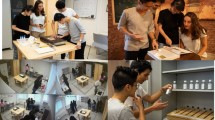Abstract
This work shows the results of the research, applied to 38 students of the first grade of high school from a private institution who take the Mathematics course. This research aims to evaluate the Escape Rooms as a strategy to strengthen collaborative work, problem solving and logical reasoning on the part of students, through mathematical challenges; that are approached from Bruner's theory, which allows building mental representations using technological tools to practice, favoring the understanding of mathematics. The strategy used is based primarily on George Polya’s methodology for problem solving, where each of the challenges leads to respond to a specific situation of the proposed topic in the virtual classroom. Also, it is important to mention that Escape Rooms have fundamental elements to increase the motivation of the students; it is the narrative that awakens a curiosity to know a real or science fiction event, with the purpose of capturing the attention of the user to carry out certain actions that the teacher proposes in the educational field. Among multiple findings, relevant aspects were found in collaborative learning and there is a dominant trend in the group that applied gamification oriented to factors of fun, motivation, and active interest during Mathematics classes. In conclusion, the successful use of gamification promotes playful and practical learning in the classroom.
Access this chapter
Tax calculation will be finalised at checkout
Purchases are for personal use only
Similar content being viewed by others
References
Chacón, M.: Estrategia didáctica para fortalecer la competencia de resolución de problemas en estudiantes de un curso de ecuaciones diferenciales de una Universidad privada [tesis de maestría]. Universidad Autónoma de Bucaramanga
Romero, C., Buzón, O., Olivets, A.: Gamificación y Escape room educativo: una experiencia para el aprendizaje del algebra, Congreso Iberoamericano la Educación ante el nuevo en- torno digital (2019)
Rodas, L., Guede, R., Tolmos, P.: Gamificación en la formación de maestros de educación de primaria, In: Chaves, A., Peñalva, S.,Rodas,L.(eds.) Colección Comunicación e Informa- ción Digital,vol. 1, pp. 79–93. Egregius (2018)
OCDE.: Marco de Evaluación y de Análisis de PISA para el desarrollo: lectura, matemáticas y ciencias, versión preliminary. OCDE Publishing Paris (2017)
Borrego, C., Fernández, C., Blanes, I., Robles, S.: Room escape at class: escape games activities to facilitate the motivation and learning in computer science. J. Technol. Sci. Educ. 7(2), 162–171 (2017)
Guerrero, J., Ramos, C.: Metodología de aprendizaje Basada en Metáforas Narrativas y Ga- mificación: Un caso de estudio en un Programa de Posgrado Semipresencial. Hamut’ay 5(1), 84–104 (2018)
Gascón, C.: Escape Room como recurso didáctico en el aula de educación infantil [tesis de maestría]. Universidad de Valladolid (2018)
Poly, G.: Cómo plantear y resolver problemas. México: trillas (1965)
Salmerón, I.: Escape classroom. Propuesta didáctica motivadora para la clase de matemáti- cas [tesis de maestría]. Universidad de Almerías (2017)
Godoy, C.: Propuesta pedagógica para desarrollar estrategias de gamificación que influyan en el Desarrollo del pensamiento lógico matemático [Tesis doctoral] (2020)
García, D.: Gamificación y competencias matemáticas en los estudiantes de 6to grado de la I.E.2071 César Vallejo, Los Olivos. [Tesis de maestría] (2019)
Navarro, A.: Los Escape Rooms como recurso motivador en el aula de matemáticas [Tesis de maestría]. Universidad Valladolid (2020)
Fenández, M.: Room Escape tecnológico. [Tesis de maestría]. Universidad Pública de Na- varra (2018)
Author information
Authors and Affiliations
Corresponding author
Editor information
Editors and Affiliations
Rights and permissions
Copyright information
© 2022 The Author(s), under exclusive license to Springer Nature Singapore Pte Ltd.
About this paper
Cite this paper
Chacón-Castro, M., Aimacaña-Espinosa, L., Jadán-Guerrero, J. (2022). Escape Rooms: Mathematical Challenges Available to Educators. In: Mesquita, A., Abreu, A., Carvalho, J.V. (eds) Perspectives and Trends in Education and Technology. Smart Innovation, Systems and Technologies, vol 256. Springer, Singapore. https://doi.org/10.1007/978-981-16-5063-5_16
Download citation
DOI: https://doi.org/10.1007/978-981-16-5063-5_16
Published:
Publisher Name: Springer, Singapore
Print ISBN: 978-981-16-5062-8
Online ISBN: 978-981-16-5063-5
eBook Packages: Intelligent Technologies and RoboticsIntelligent Technologies and Robotics (R0)




